UCT Faculty of Science Honours Alumni Excellence at Lecture Series
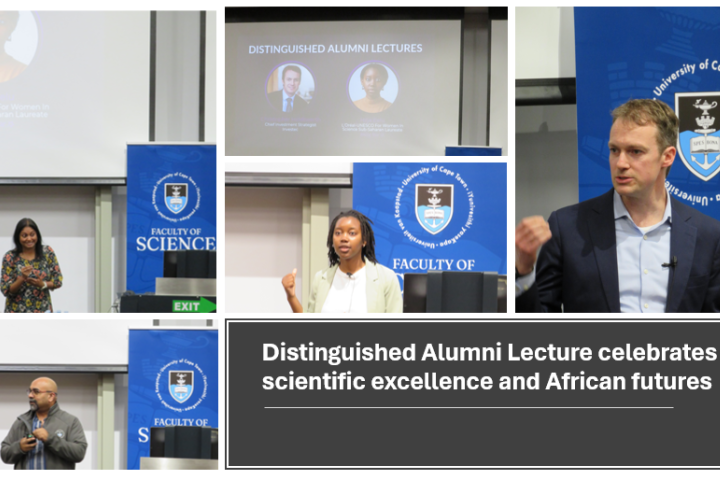
UCT Faculty of Science Honours Alumni Excellence at Lecture Series
The University of Cape Town’s Faculty of Science hosted its annual Distinguished Alumni Lecture Series, a flagship event that celebrates the achievements of graduates who have made meaningful contributions to science, society, and industry. Held at UCT’s campus on September 30, Cape Town, South Africa, brought together faculty, students, and alumni to reflect on the evening featured two dynamic speakers (Hilja Eelu-Uusiku and Chris Holdsworth) whose journeys reflect the power of education, resilience, innovation, and personal responsibility.
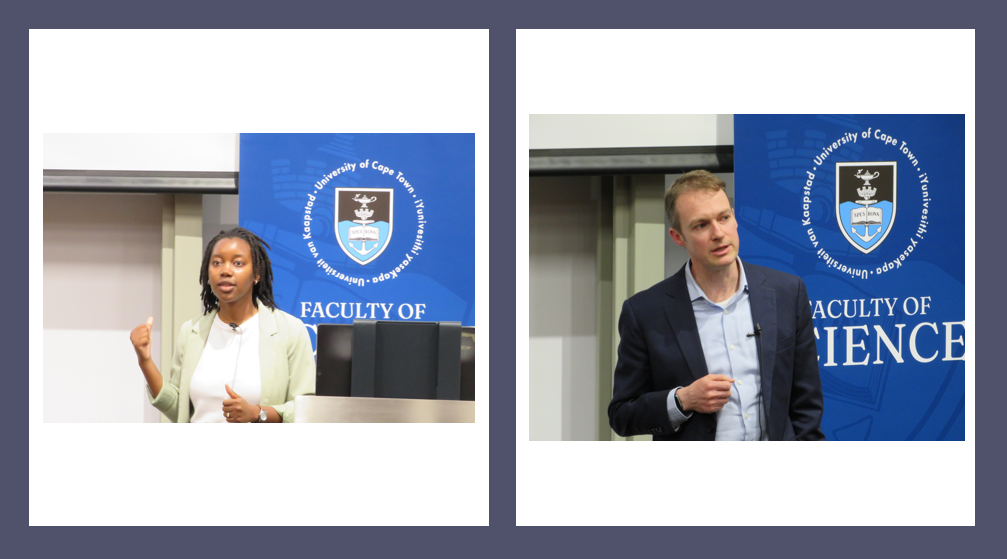
Opening Reflections: Strengthening the Alumni Bond
Professor Sheetal Silal welcomed attendees with a message that underscored the importance of alumni engagement and the university’s role in shaping future leaders.
“This series is about celebrating those who’ve made contributions locally, nationally, and globally,” she said. “It’s also about listening to how UCT has helped shape their journeys.”
Dean Faculty of Science, Professor Hussein Suleman, light-heartedly shared his reflections on the deep connection between graduates and the university.
“Even if you don’t attend every event, the bond remains strong,” he said. “UCT continues to be a part of your story.” Dean Faculty of Science, Professor Hussein Suleman, light-heartedly shared his reflections on the deep connection between graduates and the university.
“Even if you don’t attend every event, the bond remains strong,” he said. “UCT continues to be a part of your story.”
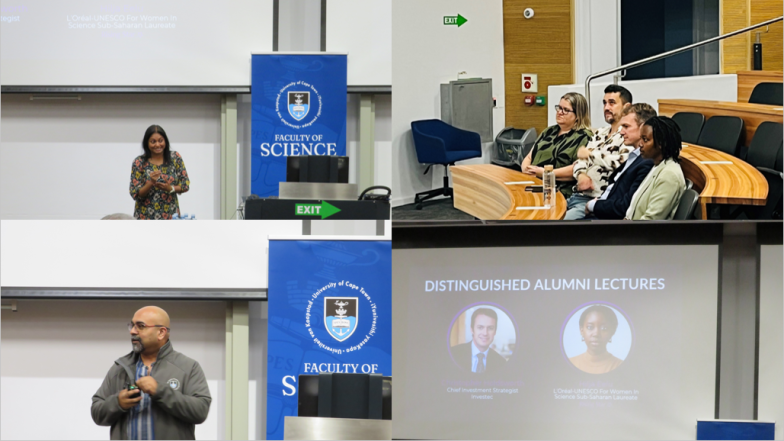
Hilja: From Namibia to Global Impact — A Journey of Science and Social Responsibility
The first speaker of the evening, Hilja Eelu-Uusiku, captivated the audience with delivered a deeply personal and inspiring talk titled “Personal Social Responsibility.” A PhD candidate in Statistical Sciences at UCT, Hilja shared her remarkable journey from Namibia to Cape Town, where her academic and personal growth flourished.
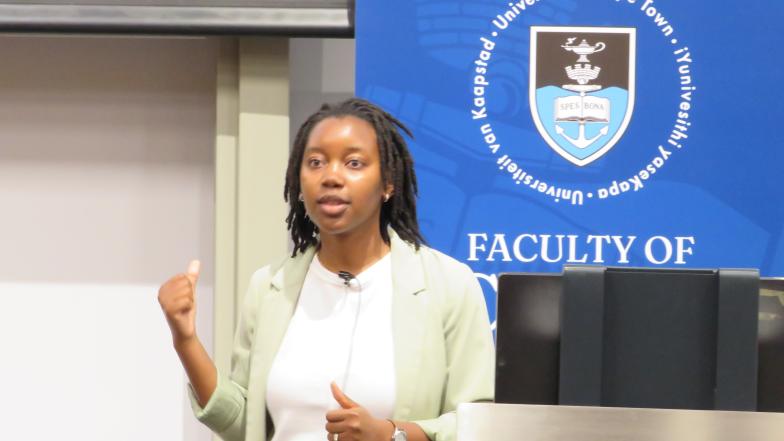
A Transformative UCT Experience
Hilja described her time at UCT as inspiring, both intellectually and personally. She arrived in Cape Town nine years ago, uncertain but determined to pursue a BSc Honours in Molecular and Cell Biology at UCT.
She credited key mentors in the Faculty of Science and the Faculty of Health Sciences for shaping her academic path. Her experiences with staff and postgraduate researchers at UCT not only guided her through complex research, but also encouraged her to think critically about the social impact of science.
“I was particularly inspired by the eh! Woza project and the work they do in community education around TB prevention.”
During her time at MASHA Hilja contributed to the News Team, writing articles and improving her skillset in science communication. She was also able to work as a consultant on one of MASHA’s projects: amassing skills that she will later use in her endeavours to increase public health research capacity and science education in Namibia. She also later pursued a Postgraduate Diploma in Health Professionals Education at UCT.
A Mission Rooted in Responsibility
Hilja emphasized the importance of paying it forward – a concept she learned during her time as an Allan Gray Orbis Foundation fellow. Supported early by various funding and training opportunities, she credits that support with shaping her commitment to uplift others.
Now, her PhD research focuses on malaria modelling — using mathematical tools to help governments and health agencies make better decisions in disease control and resource allocation in Namibia.
Her work has earned her international recognition, including the 2024 L’Oréal-UNESCO Women in Science Young Talent Award, placing her among the top 30 young women scientists in Sub-Saharan Africa.
Hilja closed her talk with a powerful message about purpose and legacy:
“There’s a scripture that says: ‘To whom much is given, much is expected.’ Personal social responsibility is about using your own talents, skills and expertise to give back to the community in whatever shape and form works for you.”
Her story is a testament to the transformative power of education, the importance of mentorship, and the impact one person can have when they choose to lead with purpose.
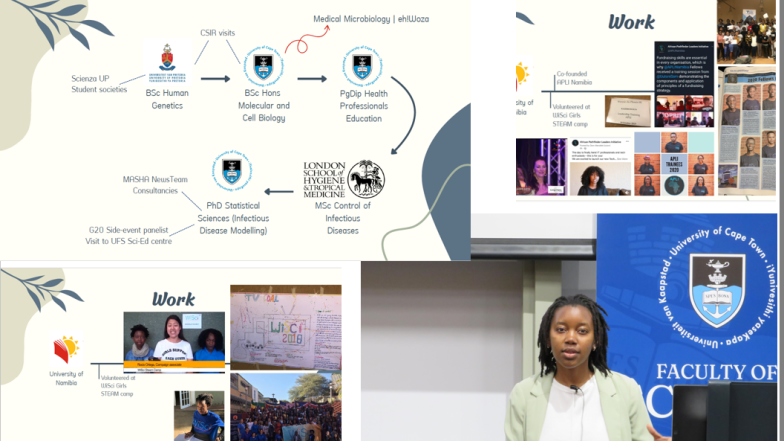
Chris Holdsworth: Forecasting the Future and Africa’s Role
The second speaker, Chris Holdsworth, Chief Investment Strategist at Investec Wealth & Investment, delivered a thought-provoking talk titled “The Future is African.” A UCT alumnus with an MSc in Mathematical Statistics and a CFA Charter holder, Chris shared his journey from student to strategist, reflecting on the challenges, mentorship, and intellectual curiosity that shaped his career.
“I didn’t walk into my first job with a clear path. I faced rejection — twice — before a UCT professor took a chance on me. That moment changed set up the early stages of my career.”
Chris credited Professor Brian Kantor from UCT’s Economics Department for giving him his first opportunity as a research assistant, a role that exposed him to the world of report writing, financial analysis and macroeconomic strategy. That experience laid the foundation for his career at Investec, where he now leads the firm’s thinking on global trends, risk, and investment strategy.

The Limits of Forecasting
He explored the complexities of economic forecasting, noting that despite technological advances, predictions remain unreliable.
“We’re not materially better at forecasting economic variables than we were 30 years ago,” he said. “Even the best models can’t fully account for human behaviour and systemic complexity.”
He illustrated this with examples from global institutions like the International Monetary Fund (IMF) and International Energy Agency (IEA), which have repeatedly missed the mark on predicting recessions and technology adoption — particularly in the case of solar energy and demographic shifts.
Africa’s Demographic Advantage
Chris emphasized that while forecasting is imperfect, some trends are undeniable — and Africa’s demographic rise is one of them. By 2100, Africa is projected to account for 40% of the global population. The continent will have the largest working-age population in the world. As China and India’s labor forces plateau or decline, Africa’s will surge.
“If the future economy still requires labor, Africa will be the source,” he said. “But we must act now — the opportunity is massive, and so is the risk if we fail to prepare.”
Chris stressed that this demographic shift presents both a challenge and a chance. To harness it, Africa must invest in infrastructure — ports, railways, and digital connectivity — and most critically, in education.
Education as the Catalyst
In his statements underline that the most critical investment we can make is in education. Chris argued that education is the most powerful lever for unlocking Africa’s potential. With technologies like satellite internet, remote learning platforms, and AI-driven content delivery, it’s now possible to reach even the most remote communities.
“It’s not inconceivable that we’ll soon have superstar lecturers teaching 20,000 students across the continent — live, online, and interactive.”
He called on institutions like UCT to lead this transformation, not only by educating students but by building the infrastructure for continent-wide learning.
“UCT has already trained future educators. Now it has a unique opportunity to scale that impact across Africa.”
🔔 A Call to Action
Chris ended his talk with a powerful message:
“We don’t need perfect forecasts to act. We need vision, commitment, and collaboration. Africa’s demographic rise is not just a statistic — it’s a call to action.”
His closing words resonated with the audience:
“Let’s build the infrastructure, educate the youth, and unlock the full potential of this continent. The future is African.”

Closing Remarks and Appreciation
Professor Sheetal concluded the evening with a vote of thanks to the speakers, the Dean, the organizing team, and all attendees. Each speaker received a book as a token of appreciation — a symbol of continued learning and inspiration.
“We are proud of our alumni and grateful for their contributions. Their journeys inspire us to keep pushing the boundaries of science and education.”
Attendees were invited to stay for refreshments and informal networking, with a call to continue engaging in future Faculty of Science events.
